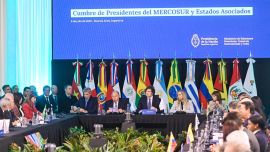Brazil’s state-controlled oil producer Petroleo Brasileiro SA is hunting for shale gas deals in Argentina as part of a bigger plan to increase supplies of the fuel to spur industrial growth, according to people familiar with the strategy.
Assets in which Petrobras is looking to acquire a stake include those of Tecpetrol SA, a unit of billionaire Paolo Rocca’s Techint Group, said the people, who asked not to be identified because the matter is confidential.
Petrobras said in a response to questions that it’s looking to generate value and restore oil and natural gas reserves through opportunities in Brazil as well as abroad, which it outlined in its five-year strategic plan. Tecpetrol declined to comment.
Petrobras is looking to expand internationally, with a particular focus on oil and gas projects in Latin America and off Africa’s Atlantic coast, instead of limiting itself to deepwater fields in Brazil. The strategy is a source of controversy within a government that also vows to prioritise its environmental agenda, including attempts to foster a green transition of Brazil’s economy.
Other major gas producers in Argentina’s heralded Vaca Muerta shale patch are state-run YPF SA, TotalEnergies SE, Pampa Energía SA, and Pan American Energy Group, which is 50 percent owned by BP Plc.
Petrobras divested its Argentina assets several years ago but kept a 34 percent stake in the Rio Neuquén shale gas field, a venture with YPF and Pampa.
New momentum in Vaca Muerta means Argentina could export gas to Brazil as soon as next year. But instead of just importing the fuel, Petrobras would like to be involved on the production end, the people said.
Argentine engineers are working to reverse the flow of a major pipeline, with the idea that Vaca Muerta drillers can use it to send surplus fuel to São Paulo via Bolivia. Bolivia traditionally pipes gas to both its neighbours, but its output is now in severe decline.
In August, Argentina pre-authorised Tecpetrol and TotalEnergies to export gas to Brazil, according to the province of Neuquén, which holds the largest share of Argentine shale reserves.
Government officials and industry executives are toying with the idea of also extending another pipeline network to be able to send gas directly into southern Brazil, avoiding a circuitous route through Bolivia.
Expansion
Petrobras’ production is set to peak around 2030 unless it makes major discoveries or acquisitions. Vaca Muerta, which is often compared to the Permian Basin in the United States, could help.
The shale formation has seen a series of false dawns over the past decade because of Argentina’s tough business climate. But pipeline buildouts and deregulation under President Javier Milei are driving drilling investments and export plans, with production in the Neuquén Basin reaching seasonal highs of the equivalent of more than one million barrels a day.
Brazil’s gas ambitions even surpass political rivalry. President Luiz Inácio Lula da Silva has traded barbs with Milei all year as diplomatic ties sour between South America’s two largest economies. But in June, Lula met Neuquén Governor Rolando Figueroa during an investment conference in Rio de Janeiro. Lula also met this month with Petrobras Chief Executive Officer Magda Chambriard to discuss how to grow supplies and reduce prices, while Mines and Energy Minister Alexandre Silveira strongly proposes using gas to boost Brazil’s industry and manufacturing sectors.
But importing Argentine gas may undermine Brazil’s ambitions to become a global leader in the energy transition as the fuel could displace renewables.
If South America’s largest economy turns to its gas-fired plants for power, it could be a setback for one of the cleanest electricity grids in the world: About 90 percent of Brazil’s grid currently runs on renewable energy sources including hydro, wind and solar. Gas also competes with green hydrogen — where Brazil seeks to be a major producer — as a feedstock for making fertilisers.
related news
by Peter Millard, Mariana Durao & Jonathan Gilbert, Bloomberg





















Comments